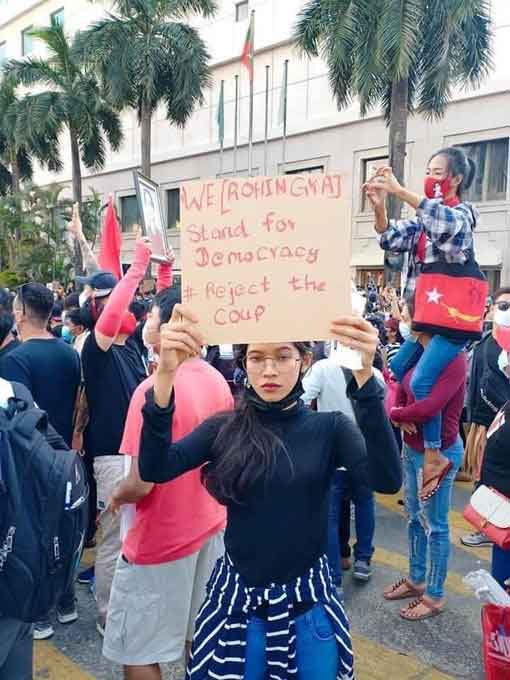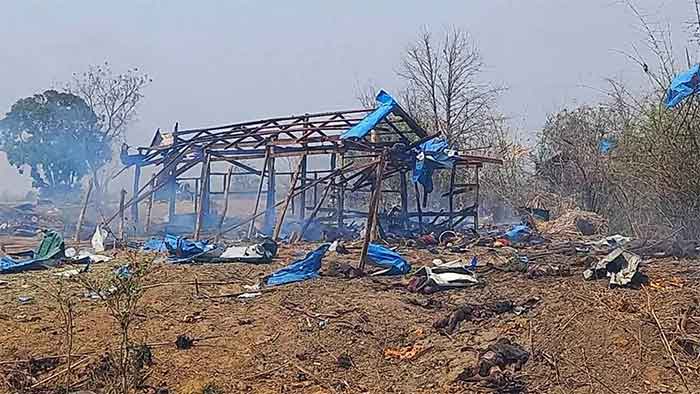
For the first time in its history, legions of civilians in Myanmar, also known as Burma, are forging courageous resistance against a bloody military dictatorship — together. This in a country of enormous ethnic diversity, many languages and religions, and entrenched sexism. Such defiance reflects a desperate yearning for genuine democracy.
In the November 2020 elections, when the military’s party lost by 83%, the generals declared the outcome fraudulent. On Feb. 1 they deposed Aung San Suu Kyi’s civilian government. Four days later, ethnic minority activists, female garment workers, and students took to the streets in outraged protest. The military, called Tatmadaw, has been murdering and arresting rebels ever since. So far, nearly 1,000 people have been killed, several thousand detained, and hundreds of thousands displaced by merciless martial law.
Although unions were illegal until 2011, union and non-union workers from every sector have protested the coup with a wave of strikes. Millions joined a general strike in late February. Medical workers have closed down public hospitals and set up free clinics. A nationwide “silent strike” has emptied the streets of millions who simply stay home. On May 7, the major unions called for a total strike. Myanmar’s economy is paralyzed.
As of early May, pro-democracy forces were increasingly engaged in armed struggle, led and trained by militias based in border ethnic regions where the military is conducting deadly air strikes. Given the massive scale of opposition and ruthlessness of the Tatmadaw, some soldiers are defecting and protecting protesters! The rebellion is far from over, as forces solidify, armed resistance climbs, and demands for international help ring out.
Intolerable conditions
Myanmar is a country of approximately 55 million that finally escaped Britain’s 120-year colonial occupation in 1948. It was left with great political and economic instability and has suffered decades of military rule. Its economic system is today described as “khaki capitalism,” the military-dominated economy which prevails in Southeast Asia.
Ethnic nationalities make up about one-third of the country’s population and inhabit half of the land area. The influence of the Bamar, Myanmar’s dominant and privileged ethnicity, led to the election of Aung San Suu Kyi, herself a daughter of the Burmese army’s founder. Her government upheld the power of the military. And she defended Myanmar’s genocide of the Rohingya in the international arena of public opinion. Many protesters favor her return, but not the ethnic minorities, who have long been abused, pitted against each other, segregated as “inferiors,” and forced into the lowest-paid jobs.
Global capitalists benefit from Burma’s desperately poor workforce and own most of the country’s wealth. Its abundant natural resources include rice, gems, oil and gas. China and Thailand account for more than half the country’s trade volume, while Singapore is the single largest foreign investor. The garment industry is the second largest exporter and is dominated by Chinese and Vietnamese capitalists who profit from Myanmar’s starvation wages.
The most oppressed lead
From the beginning, the strongest resistance to Tatmadaw came from organized workers, many from independent unions that represent garment workers, teachers and medical staff — sectors that are predominantly female.
Esther Ze Naw, a 28-year-old ethnic Kachin who led the first massive protest on February 6, criticizes Suu Kyi’s political party, the National League for Democracy (NLD) because it “neglects all issues from ethnic areas,” making minorities “second-class-citizens in our own country.” Another feminist leader underscores that the first “who came out on the street against the military junta were … young women factory workers.”
Myanmar’s ethnic groups have fought for self-determination for decades, and in many cases are de facto states that provide governance, schools and public services. More than two dozen experienced ethnic militias are playing an increasingly important role in the struggle. Several now share their armed self-defense skills with urban dissidents.
Coming from a position of scorn and illegality, Burmese LGBTQ+ activists by the hundreds have also joined the struggle and hope for increased support for their rights in a future democracy.
Fearless students, desperate for survival and a future, are collaborating with garment workers in the General Strike Committee of Nationalities (GSCN), which coordinates country-wide protests. GCSN’s program calls for a democracy in which ethnic nationalities have equal representation — a first.
What comes next?
Grassroots activists in several countries are demanding action from their governments. The United States froze a billion-dollar transfer to Burma from the U.S. Federal Bank and sanctioned the gems business. But largely, U.S., British and European Union sanctions target only individuals. The Association of Southeast Asian Nations (ASEAN), itself made up of khaki capitalist regimes, has called for a “peaceful resolution,” as have China and Russia. Each has flatly rejected sanctions. They are beneficiaries of Myanmar’s economy, and do not want business interrupted.
By contrast, pro-democracy forces demand targeted sanctions against military-owned and -controlled businesses; a global arms embargo; an end to Tatmadaw air strikes on ethnic territories; and a halt to foreign oil companies doing business with the Myanmar military, 70% of whose operations are bankrolled by the petroleum industry. Most important is preventing major world governments from military intervention.
International unions, big and small, need to ambitiously organize strike funds and humanitarian aid. Intense global, grassroots pressure to halt lucrative corporate business dealings with Myanmar’s dictatorship is a must.
Burma’s ongoing uprising proves the courage, skills and solidarity of its deeply diverse working class. As Burmese historian Thant Myint-U says, “In the end some kind of revolution must come.” One for “change across ethnic lines, toward a fairer and freer society for all of Burma’s peoples.”
Today, they wage strikes against a military connected in every sinew to the capitalists who oppress them. Their fight for democracy could logically lead to a struggle against the oppressive profit system itself and ignite similar rebellions in the region.
Monica Hill is a long time immigrant rights activist and writer for the Freedom Socialist. Feedback [email protected]
Freedom Socialist newspaper, Vol. 42, No. 3, June-July 2021 www.socialism.com
GET COUNTERCURRENTS DAILY NEWSLETTER STRAIGHT TO YOUR INBOX















































